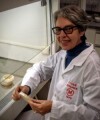Actualidad
Thermal Treatment Prevents Blue Mold in Stored Apples
The transcriptomic profile of apples treated at 45°C demonstrates the involvement of a defense response to blue mold infection caused by Penicillium expansum

Apples are an economically significant fruit crop highly appreciated by consumers for their sensory and nutritional characteristics. They are consumed directly after harvesting or stored for up to 12 months to ensure continuous availability.
The majority of apple deterioration during postharvest storage is caused by fungal infections.
Restrictions on fungicide use set by regulatory agencies in the European Union and other countries, along with consumers' rejection of fruits with pesticide residues, have spurred research into alternative control measures. Additionally, in some cases, pathogen resistance development can affect the efficacy of fungicides.
Thermal Treatments
Among the physical treatments applied to fruit for postharvest pathogen control, hot water has emerged as a safe and effective technique with a direct impact on pathogenic fungal spores and induction of defense responses in harvested products.
Recent studies have described a significant reduction (between 80% and 100%) in rot incidence by submerging fruits for 3 minutes in water at 50–54 °C or by spraying them with water at 55 °C for 25 seconds.
Plant Responses to Thermal Stress
Sublethal thermal treatments have profound effects on plant cell and tissue physiology. Plants have developed various mechanisms to withstand high-temperature stress.
Responses are triggered through a signaling cascade transmitted by the induction of kinases*, resulting in the activation of transcription factors and chaperone proteins. Among the induced proteins are various classes of heat shock proteins.
Comprehensive transcriptome analysis and sequencing have become valuable tools to provide a complete picture of plant responses at the biochemical level, such as susceptibility to diseases and resistance to environmental stress.
Understanding the molecular events associated with the thermal treatment of apples provides valuable information for optimization.
Thermotolerance and Pathogen Resistance
Recently, a group of scientists investigated the effect of water treatment at 45 °C for 10 minutes on apples' response to blue mold infection caused by Penicillium expansum. Subsequently, they were stored at 20 °C for 6 days, resulting in a 100% reduction in fruit rot incidence.
Transcriptional and gene expression analyses were conducted on fruits in response to thermal treatment, showing a significant positive regulation of heat shock protein transcription factor genes involved in thermotolerance.
This indicates that apples respond to thermal treatment in a programmed manner, suggesting that genes responsible for thermotolerance may also be involved in the induced response to pathogen resistance.
Kinase is a type of enzyme that transfers phosphate groups from high-energy donor molecules (such as ATP) to specific target molecules (substrates).
Sources
Spadoni, A.; Guidarelli, M.; Phillips, J.; Mari, M.; Wisniewski, M. (2015). Transcriptional profiling of apple fruit in response to heat treatment: Involvement of a defense response during Penicillium expansum infection. Postharvest Biology and Technology, 101: 37-48.
Fallik, E. (2004). Prestorage hot water treatments (immersion, rinsing, and brushing). Postharvest Biology and Technology, 32 (2): 125-134.
Aghdam, M. S.; Sevillano, L.; Flores, F. B.; Bodbodak, S. (2013). Heat shock proteins as biochemical markers for postharvest chilling stress in fruits and vegetables. Scientia Horticulturae,160:54-64.
Image source
https://www.directoalpaladar.com.mx/ingredientes-y-alimentos/es-temporada-de-manzanas-aqui-te-decimos-todo-lo-que-necesitas-saber-para-cocinar-con-ellas Accessed on 06/02/2024.













